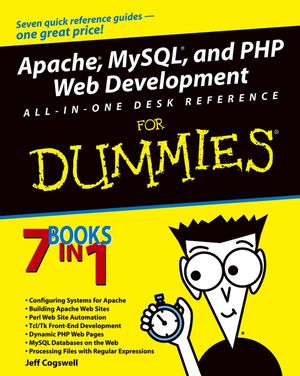Apache, MySQL, and PHP Web Development All-in-One Desk Reference For DummiesISBN: 978-0-7645-4969-4
Paperback
760 pages
December 2003
 This is a Print-on-Demand title. It will be printed specifically to fill your order. Please allow an additional 10-15 days delivery time. The book is not returnable.
|
||||||
Book I: Configuring Linux and Windows for Apache.
Chapter 1: Configuring Linux.
Chapter 2: Configuring Windows.
Chapter 3: Ten Third-Party Packages That Enhance Security.
Book II: Building an Apache Web Site.
Chapter 1: Introducing the Apache Web Server.
Chapter 2: Installing Apache.
Chapter 3: Configuring Apache.
Chapter 4: Apache Modules.
Chapter 5: Ten Security Tips.
Book III: Perl Web Site Automation.
Chapter 1: Introducing Perl.
Chapter 2: Simple Data Types.
Chapter 3: Comparing and Testing Variables.
Chapter 4: Controlling the Structure of Your Program.
Chapter 5: Processing Text Files and Directories.
Chapter 6: Advanced Perl Coding.
Chapter 7: Perl and CGI Scripts.
Chapter 8: Ten Useful Perl Functions.
Book IV: Tcl/Tk Front End Development.
Chapter 1: What Are Tcl and Tk?
Chapter 2: Processing Variables and Expressions.
Chapter 3: Controlling the Structure.
Chapter 4: Building Procedures.
Chapter 5: Manipulating Files.
Chapter 6: Programming with the Tcl Packages.
Chapter 7: Designing GUIs with Tk.
Chapter 8: Arranging Controls, Drawing Pictures, and Handling Text.
Chapter 9: Displaying Standard Dialog Boxes in Tk.
Chapter 10: Ten Useful Tcl/Tk Tools.
Book V: PHP Web Pages for Dynamic Content.
Chapter 1: What You Can Do with PHP.
Chapter 2: Writing Server-Side Scripts.
Chapter 3: Storing Information.
Chapter 4: Controlling the Program Flow.
Chapter 5: Arrays and Functions.
Chapter 6: Interacting with HTML.
Chapter 7: Advanced Programming with PHP.
Chapter 8: Creating Graphics.
Chapter 9: Modeling Data with Classes.
Chapter 10: Ten Ways to Enhance Your Web Site.
Book VI: MySQL Databases on the Web.
Chapter 1: What Is MySQL?
Chapter 2: Managing Databases and Tables.
Chapter 3: Relating Your Data.
Chapter 4: Accessing MySQL from PHP.
Chapter 5: Querying with SQL and PHP.
Chapter 6: Accessing MySQL from Perl.
Chapter 7: Creating a Username System for Your Web Site.
Chapter 8: Ten Ways to Enhance a Web Site with Databases.
Book VII: Processing Web Files with Regular Expressions.
Chapter 1: Why Use Regular Expressions?
Chapter 2: Following the Syntax of Regular Expressions.
Chapter 3: Customizing, Searching, and Replacing.
Chapter 4: Grouping and Capturing.
Chapter 5: Joining, Splitting, and Making Up.
Chapter 6: Processing Multiple Lines and Files.
Chapter 7: Processing HTML Files.
Chapter 8: Ten Regular Expression Gotchas.
Book VIII: Appendixes.
Appendix A: Managing Files with CVS.
Appendix B: Understanding Open-Source Licenses.
Index.



